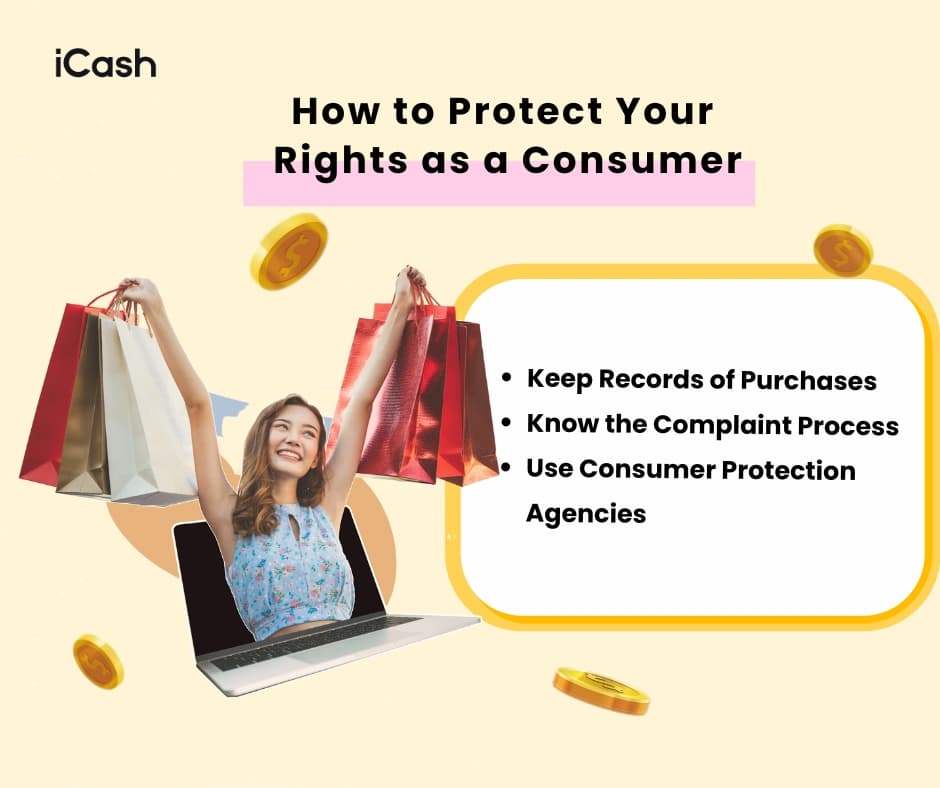As a consumer, knowing your rights and responsibilities is important. It helps you make better decisions when buying goods or services and ensures that you are treated fairly.
When you understand your rights, you can stand up for yourself if something goes wrong, like if a product you purchased doesn’t work as promised or if a service is not delivered or conducted as expected. Knowing your rights means you won’t be taken advantage of and can get what you pay for.
But being a responsible consumer matters too. Responsibilities include things like reading the fine print, paying on time, and using products safely. When you understand your responsibilities, you’re less likely to end up in disputes with businesses.
All of this leads to better business practices and a positive experience for everyone involved. So, whether you’re buying a new phone or paying for a cleaning service, knowing your rights and responsibilities will always help you make smart, fair choices.
Your Consumer Rights

As a consumer, companies must protect consumers when they are buying any sort of product or service. These rights are in place to make sure you are treated fairly and safely. Here are some of the most important rights you have:
The Right to Safety: You have the right to expect that the products you buy are safe to use and have your well-being in mind. Companies must always make sure that their products are tested and keep consumers safe and in a healthy environment if used properly.
The Right to Be Informed: You have the right to know all the important details about a product or service before you buy it. This includes things like the price and how to use the product.
The Right to Choose: You have the right to choose from a variety of products and services at competitive prices. This means that companies should not try to limit your choices unfairly or create a monopoly where they are the only option (though unfortunately, this does happen).
The Right to Be Heard: If you have a complaint or a problem with a product or service, you have the right to speak up and say something. Businesses should listen to your concerns and work on solving them - it should be that simple.
The Right to Redress: If something goes wrong or if you end up with defective goods, you have the right to a fair resolution. This could mean getting a refund, a replacement, or simply having the issue fixed and companies must ensure consumers have this option.
Your Responsibilities as a Consumer

Consumer education isn’t just about knowing your rights, it’s also about understanding which parts are consumer responsibilities.
When you buy something, especially online, it’s important to provide accurate information. This helps businesses serve you better and avoids any misunderstandings. Giving false information can lead to trouble down the road.
Before agreeing to buy something or signing a contract, you should always read it carefully. Contracts often have important details about costs, conditions, or what happens if you change your mind about something. If you don’t understand something, don’t be afraid to ask questions.
Many products come with a warranty, which is a promise that the product will work for a certain amount of time. It’s your responsibility to understand what the warranty covers and for how long.
If you need to return something, it’s important to understand the store’s return policy. Some items might not be returnable, or you might have a limited time to bring them back.
How to Protect Your Rights as a Consumer
To make sure your rights are protected, it’s important to take a few simple steps. Here are some tips on how to protect your rights:
Keep Records of Purchases: Always keep receipts, contracts, or any other paperwork related to your purchases. If they’re physical receipts, keep them in a safe place like a folder or a desk drawer. If they’re digital receipts, save them in your email, cloud storage, etc. These records are proof of what you bought and when, and they can be beneficial if you need to return an item or make a complaint.
Know the Complaint Process: If you’re unhappy with a product or service from a business, it’s important to know how to make a complaint. Contact the company or store where you made the purchase. Be polite, but clear about what went wrong and what you want them to do.
Use Consumer Protection Agencies: In Canada, some agencies can help if a business isn’t treating you fairly. Organizations like the Better Business Bureau can provide advice and support. They can help you understand your rights and, in some cases, even help solve disputes.
By keeping good records, knowing how to complain, and reaching out to consumer protection agencies if needed, you can make sure your basic rights are respected.
It’s always better to be an informed consumer, so you can stand up for yourself when needed!
Knowing your consumer rights is also essential before taking out any loan. To learn more about available loan options, click here to learn more about payday loans!












